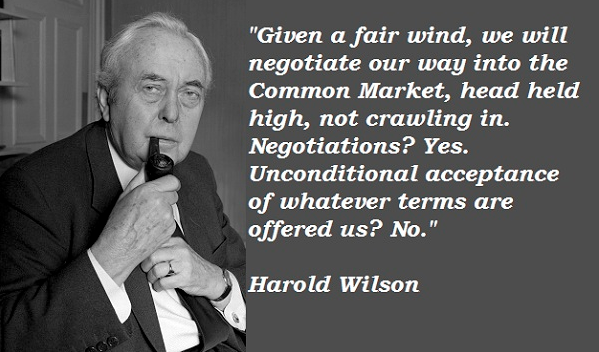Cost and Benefits of EU Membership
11th October 2015
The Politics and Economics of the EU
The question is likely to be: “do you want to leave or remain in the EU?” We will then tick one of two boxes. The referendum, due in 2017 is a gamble for David Cameron – a political device to ward off the threat of UKIP stealing more Tory votes, and of backbench rebellions ruining his attempt to govern with a slim 8 seat majority. The tactic has been used before: by Harold Wilson in 1975, for example, again to try to bypass a divided party and establish some greater political authority: he had earlier declared, “Given a fair wind, we will negotiate our way into the Common Market, head held high, not crawling in. Negotiations? Yes. Unconditional acceptance of whatever terms are offered us? No.”
The economic arguments for and against EU membership are complex. The out  campaigners attempted this week to advertise the idea that the EU costs Britain £350m a week, or £20bn a year. But this figure, as the Sunday Times points out today, is misleading, as it doesn’t take into account the money Britain gets back from the EU in grants.
campaigners attempted this week to advertise the idea that the EU costs Britain £350m a week, or £20bn a year. But this figure, as the Sunday Times points out today, is misleading, as it doesn’t take into account the money Britain gets back from the EU in grants.
Nor does it address more complex issues: the dynamic benefits in economic growth over time of belonging to a large free trade area (45% of our exports go to the EU), and one which enjoys freedom of movement – liberating the labour supply curve and attracting cheap labour into the UK. The UK has for some years also been a financial capital of the world, recycling investment funds and being the chosen location for many multinational banks, poised as we are between a European capital market and Wall Street. Assessing true economic benefits are therefore extremely difficult and liable to distortion.
Pro-Europe campaigners may also be guilty of overplaying their cards. Stuart Rose, writing in the Sunday Times today (October 11th 2015), quotes the CBI report arguing that 3m jobs depend on EU membership, and that lower prices due to competition is worth £450 a year to every consumer. This benefit, plus inward investment and trade benefits are said to be worth £3,000 per head. If our net contribution per head is £340, membership yields, according to Rose, a tenfold return – we get back ten times what it cost us. But how do we test the veracity of these figures? How do we set this against the opportunity cost of not being in Europe?
Then there are the political costs and benefits of membership. One cost is now evident: the inability of Europe to police its borders successfully has led to tensions across the EU, even in Angela Merkel’s Germany whose open borders policy is beginning to produce an electoral backlash. 1.5m new migrants is a lot of housing, school places, and hospital provision to find even in a country of 83m.
And political benefits? These are to do with the power of co-operative activity, the ability to enlarge and stimulate new economies, thus providing enlarged solidarity, and of course, peace, the goal that Churchill aspired to in his vision of a united Europe. A trade bloc of 500m people has greater influence than a bloc of 62m people – in negotiating against the ever-present threat of a return to protectionism and a world of tariff barriers. Free trade benefits everyone – and we need to keep free trade alive, proponents of EU membership argue.
It is hard to assess the economic validity of all these numbers, which is why the referendum will, I believe, be decided on emotional ties to ideas of nationhood, sovereignty, and fears of the ‘swarm’ of migrants jumping trains in Calais. And because of this, David Cameron is taking a huge risk, as every political leader does who hands over decision-making on key issues to the people. The risk is that the people know best, understand all the complexity and can disentangle truth and falsehood from the figures.
If the vote goes against him (we leave), the uncertainty could have profound and unintended consequences for our futures and significantly, the future of the Conservative Party.
Further: Governing with a razor slim majority

0 Comments